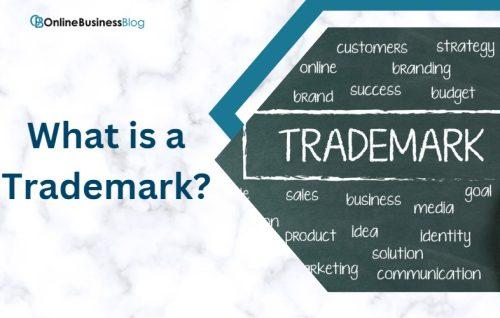Post Contents
Are you a business owner in the UK looking to protect your brand and reputation? If so, then trademarking your business name should be at the top of your priority list. A trademark is a valuable asset that can add credibility to your business and prevent others from using or imitating your brand. In this blog post, we’ll guide you through how to trademark your business name in the UK, what can be trademarked, the benefits of doing so, and answer some frequently asked questions about the process. Don’t risk losing everything you’ve built – read on to learn how to secure your brand’s identity!
What is a Trademark?

A trademark is a form of intellectual property that protects your brand identity and distinguishes it from others in the marketplace. It can be a word, phrase, logo, symbol, design or any combination of these elements. When you register a trademark for your business name or other branding assets, you gain exclusive rights to use them in trade and prevent others from using similar marks.
Trademarks are important because they help consumers identify products and services with specific companies. This helps build brand recognition and trust over time. Additionally, trademarks can increase the value of your business by making it more attractive to investors and potential buyers.
Trademark infringement occurs when someone uses a mark that is confusingly similar to another registered mark. This can lead to legal disputes and damage to reputation if not addressed promptly.
Therefore, registering a trademark is essential for protecting your brand identity as well as maintaining trust among customers while establishing a greater market presence.
What Can Be Trademarked?
When it comes to trademarking your newly started business name, it’s important to understand what can and cannot be trademarked. In general, a trademark is a symbol, word, or phrase that distinguishes one company’s products or services from another’s. But what specifically can be trademarked?
- Firstly, names and logos can be easily trademarked. This includes your business name as well as any logos associated with your brand. It’s important to note that trademarks are granted on a first-come-first-serve basis so it’s vital to register your mark early.
- Secondly, you may also consider registering any slogans or taglines used in marketing campaigns for additional protection of intellectual property rights.
- Thirdly, product packaging design and trade dress (the appearance of the product itself) may also qualify for trademarks if they are unique enough.
- Sounds such as jingles and recognizable noises like Intel’s 5-note chime have been successfully registered by companies seeking greater legal protections over their intellectual properties.
- Remember not everything can be protected under copyright law but speaking with an experienced attorney will help clarify whether your work meets the criteria necessary for registration as a valid trademark.
How to Trademark Your Business Name?

To trademark your business name in the UK, you will need to follow these steps:
- Conduct a search to ensure that your desired business name is not already trademarked by someone else. You can do this by searching the UK Intellectual Property Office’s (IPO) trademark database.
- Determine the trademark classes that apply to your business. Trademark classes categorize goods and services into different groups. You will need to identify which classes your business falls under to ensure comprehensive protection.
- Submit your trademark application to the UK IPO. You can do this online using the IPO’s trademark application service. Make sure to provide all the necessary information, including your business name, trademark classes, and contact details.
- Wait for the IPO to review your application. This process can take several months, during which time the IPO will examine your application to ensure that your trademark is distinct and not confusingly similar to existing trademarks.
- If your trademark application is approved, you will need to pay the registration fee. The fee varies depending on the number of trademark classes you apply for.
- Your trademark will be published in the UK IPO’s trademark journal, which is available for public inspection. This provides an opportunity for third parties to oppose your trademark if they believe it infringes on their own trademarks.
- If there are no objections to your trademark within two months of publication, your trademark will be registered and you will receive a certificate of registration.
It is recommended to seek professional advice to ensure your trademark registration is successful and to maximize the protection of your business name.
The Benefits of Trademarking Your Business Name
Trademarking your business name in the UK is an important step to protect your brand and intellectual property. By obtaining a trademark, you will have exclusive rights to use your business name for the goods or services that you offer.
Here are some of the benefits of trademarking your business name:
- Legal Protection: One of the main advantages of having a registered trademark is legal protection. You can take legal action against anyone who uses your business name without permission.
- Brand Recognition: A registered trademark helps build brand recognition and awareness among potential customers. It makes it easier for people to identify and remember your products or services.
- Business Credibility: Having a registered trademark adds credibility to your business, indicating that you take pride in protecting its identity.
- Potential Revenue Streams: Trademarks can be sold, licensed or franchised, which means they could become valuable assets generating income streams for years to come.
- Marketing Tool: Registered trademarks can help promote brand loyalty by distinguishing products from competitors’ offerings while creating an emotional connection with consumers.
Registering a trademark provides multiple advantages that go beyond just legal protection. The benefits include increasing credibility within the industry, gaining wider exposure through marketing efforts and potentially growing revenue opportunities over time.
The Cost of Trademarking Your Business Name in the UK
Trademarking your business name in the UK involves some costs that you need to consider before starting the process. The cost of trademarking a business name includes fees for filing an application, professional fees if you choose to hire a trademark attorney, and renewal fees once your trademark is approved.
The cost of filing an application depends on the number of classes you choose to apply under. Classifications are groups of similar products or services, and each class requires a separate application fee which can range from £170-£200 per class.
If you decide to hire a trademark attorney to help with the application process, their fees will vary depending on their experience level and the complexity of your case. It’s important to find a qualified attorney who understands UK trademark law and has experience working with businesses like yours.
Once your trademark is approved, it will be valid for ten years after which time it must be renewed. Renewal fees also depend on how many classes were applied under and typically range from £200-£300 per class.
While there are costs associated with registering a UK trademark, protecting your brand identity is essential in today’s competitive market. A trademark registration gives you exclusive rights over your brand name and ensures that no one else can use it without permission – making it well worth the investment in the long run.
How Long Does It Take to Trademark a Business Name in the UK?

The process of trademarking a business name in the UK usually takes around four to six months. However, it can take longer depending on various factors such as the complexity of your application and whether or not someone opposes your trademark.
After submitting your application to the Intellectual Property Office (IPO) online, they will conduct an examination to check if there are any conflicting trademarks already registered. This process may take up to two months.
If all goes well with the examination and no one opposes your trademark, then you should receive confirmation that your business name has been successfully registered within four months from when you submitted your application.
However, if someone does oppose your trademark during this time, it could add several more months or even years onto the registration process as disputes have to be resolved before a decision is made on whether or not to register the mark.
It’s important to note that whilst waiting for confirmation of registration, you can still use ™ next to your business name once you’ve applied for a trade mark.
Conclusion
In conclusion, trademarking your business name is a crucial step in protecting your brand identity and ensuring its exclusive use in the marketplace. By following the necessary steps and guidelines, you can establish a strong legal foundation for your business and safeguard your brand from potential infringement or misuse by others. Remember to conduct a thorough search to ensure your desired business name is available and not already trademarked by another entity.
Seek legal advice if needed to navigate the complex process of filing a trademark application with the relevant authorities. By securing a trademark for your business name, you gain the confidence and peace of mind that your brand is protected, allowing you to build and grow your business with a unique identity.
FAQs on how to trademark your business name
1. Can I trademark my business name myself?
Yes, you can, but it’s recommended to hire a professional or use an online service for better results.
2. What if someone else has already trademarked a similar name?
It depends on how similar the names are and what products or services they cover. You may need to change your name or apply for a different type of trademark.
3. How long does a UK trademark last?
A UK trademark lasts 10 years from the filing date and can be renewed indefinitely.
4. Do I need to have registered my business before applying for a trademark?
No, you don’t. But it’s important to make sure that your chosen name is available and not infringe on anyone else’s rights before registering your business or applying for a trademark.


